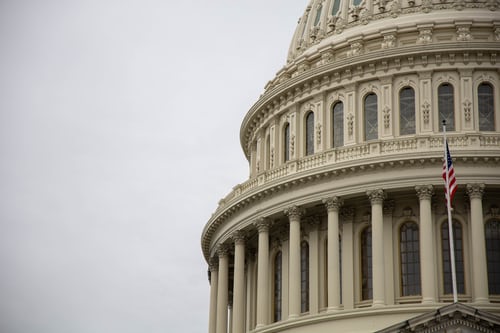Are we seeing the beginning of the end times?
PRAY FIRST for our nation’s leaders as they set policies that deal with foreign conflicts.
I have said these things to you, that in me you may have peace. In the world you will have tribulation. But take heart; I have overcome the world.” – John 16:33
Jesus told His disciples that the end times would be proceeded by times of conflict. “You will hear of wars and rumors of wars”, He said, “For nation will rise against nation, and kingdom against kingdom, and there will be famines and earthquakes in various places” (Matthew 24:6-7). When looking at the news today, does it feel like this is coming true?
Current Events
On Saturday, the House of Representatives passed a $95 billion package that seeks to replenish U.S. weapons stockpiles and provide military aid to several allies including Ukraine and Israel, as well as development and infrastructure support for Taiwan and the Indo-Pacific region. The Senate is expected to vote on it as soon as the coming week, and President Biden has said that he will sign the package as soon as he gets it.
This comes a week after escalations in the Middle East as Iran attacked Israel with ballistic missiles and drones. President Biden has told Israeli leaders that the U.S. will not participate in any offensive operations against Iran, likely not wanting to add to the tensions between the U.S. and Iran.
A Balancing Act in Global Affairs
U.S. foreign policy is a delicate balancing act in global affairs, with each decision carefully weighed against strategic interests and the pursuit of peace. One notable example of this is the United States’ longstanding alliance with Israel, which is underpinned by a commitment to the nation’s security and sovereignty. While recent U.S. policy has reaffirmed support for a two-state solution, active negotiations have not been as successful. Instead, the U.S. is focused on promoting Israeli-Arab normalization and has resumed aid for Palestinians.
Another key foreign policy issue for the U.S. is the ongoing conflict between Ukraine and Russia. In the face of Russian aggression, the U.S. has taken a firm stance in support of Ukraine’s sovereignty, including imposing comprehensive sanctions against Russia and providing substantial military and humanitarian aid to Ukraine. This approach reflects a broader strategy to uphold international law and support democratic institutions against authoritarian overreach.
Perhaps the longest standing balancing act for the United States has been its relationship with China. Rivals for economic prowess on the global stage, there is a long and diverse history between the two countries. While a mutual suspicion towards each other remains, relations have been mostly stable. However, many foresee this changing quickly if China attacks Taiwan and the United States becomes drawn in.
Coming Election
Foreign policy plays a critical role in U.S. elections, especially when international events have a direct impact on domestic concerns. Candidates’ stances on key issues such as the war in Ukraine or relations with Israel can sway voters and shape the national discourse, demonstrating the interconnected nature of global politics and internal affairs. If public discourse and ongoing protests are any indicator, the 2024 Presidential Election will be equally divided.
The Church in the End Times
An interesting aspect of global conflict is the way it can be interpreted through the lens of biblical prophecy. Many people see parallels between contemporary events and scriptural predictions of “wars and rumors of wars.” While interpretations vary, these perspectives can influence the worldview of believers and their engagement with current events.
For Christians, the quest to understand the biblical timeline has shaped thought and action throughout history. From early church fathers to modern theologians, Christians have long pondered the signs of the end times. During the global conflict of The Great War, many Christian leaders were convinced that it was the end of all things. During the Second World War, again, many believed that, surely, this must be the beginning of the end.
What is the Godly Response?
As we quickly near 100 years since the end of World War II, it becomes ever clearer that only God the Father knows the time and the hour. While we wait in times of global strife, Christians are called to pray, be peacemakers and messengers of hope, trust in God’s sovereignty, and seek peace. In the same verse that Jesus spoke of “wars and rumors of wars,” He said, “See that you are not alarmed” (Matthew 24:6). While it’s easy to feel anxious and let the issues of the day divide us, Christ encouraged Christians to be proactive in reconciliation and to embody the peace of Christ in a troubled world. Do not to fall into the trap of hating one another, and do not let the love of others grow cold (Matthew 24:12).
HOW THEN SHOULD WE PRAY:
— Pray for those in the United States government who work closely with U.S. allies and set policy regarding foreign conflict and on how best to lead the nation during turbulent times. “Blessed are the peacemakers, for they shall be called sons of God.” Matthew 5:9
— Pray for leaders in the Church as they guide their flock during times of crisis and speak God’s perfect truth of love and peace to fellow Christians. “Peace I leave with you; my peace I give to you. Not as the world gives do I give to you. Let not your hearts be troubled, neither let them be afraid.” John 14:27
CONSIDER THESE ITEMS FOR PRAYER:
- Pray for those in the Department of State as they are directly responsible for implementing foreign policy.
- Pray for God to be at work in the hearts and minds of those in Congress as they regularly evaluate the federal funding allocated to U.S. involvement in foreign conflicts.
- Pray for Americans as they prepare to vote this November, that they would pray over and evaluate foreign policy implications with each candidate.
Sources: Council on Foreign Relations, White House, Department of State, Chatham House, Christianity.com, Public Affairs Council, The Lutheran World Federation, CNN, AP News, Reuters, Cornell University









